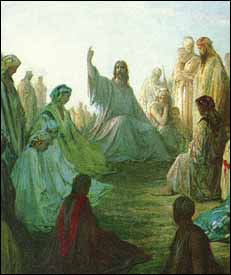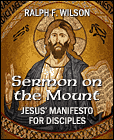
|
Old Testament
New Testament
Gospels
Acts
Paul's Letters
General Letters
Revelation
Topical Studies
Beginning the Journey (for new Christians). en Español

|
Old Testament
New Testament
Gospels
Acts
Paul's Letters
General Letters
Revelation
Topical Studies

|
Home
Bible Studies
Articles
Books
Podcasts
Search
Menu
Donate
About Us
Contact Us
FAQ
Sitemap
 Gustave Doré, Jesus Preaching on the Mount (Jesus Prechant Sur La Montagne, c. 1865), oil on canvas, 130 x 196 cm, private collection. Larger image. |
Organized religion has tended to domesticate Jesus' teaching. In his day, part of Jesus' attraction was that he was untamed, unrestricted by the religious structures of his day. When he taught, he spoke with a clear authority that troubled and angered the religious elite. But the common people flocked to him. His words challenged their souls and their way of life, but they also brought hope and an abiding peace to their lives. Jesus was setting aright a tragic misunderstanding and misinterpretation of God's true intention. When people were -- and are -- willing to repent from their wrong understandings and their un-Godly ways, they can enter a renewed Kingdom of God now and forever.
Our record of Jesus' life, ministry, and teaching covers the first four books of the New Testament -- Matthew, Mark, Luke, and John -- 89 chapters in all. This teaching seems to be distilled, however, in the three chapters that comprise Jesus' Sermon on the Mount (Matthew 5-7), probably his most definitive statement of how the Kingdom of God differed from what passed for religion in his day. I see it as the Jesus Manifesto.
"a written statement declaring publicly the intentions, motives, or views of its issuer."Manifesto:
His words were as radical in the first century as they are in the twenty-first. They possess a kind of raw force that cut us to the core of our lives. Many declare Jesus' words as a mere ideal, a hope, a pipe dream. But I believe that if we can understand what Jesus truly taught, absorb it into our spirit, and faithfully order our lives so that we can live it out here on earth, we can grow into the kind of Christians that he intends for us to be -- real Christians, Jesus Christians, world-altering Christians of whom he will be proud.
Many in our day identify themselves as "born again" Christians, that is, believers who have begun a new life through the regenerating power of the Holy Spirit (John 3:1-8). This is essential. But if born again Christians don't grow into faithful, authentic disciples of Jesus, who know his ways and live them out with integrity, they bring discredit upon both Jesus and the truth of the new birth.
The Sermon on the Mount provides an ethical and philosophical framework within which we can order our lives as followers of Jesus, who look and act like his disciples did in the first century. I commend this Sermon to you as an elixir for your souls.
This book is intended to help you grapple with and comprehend Jesus' teaching in the first century Jewish milieu in which it was first given. It is designed first to help individual believers deeply study his words. Then it is intended to provide Bible study leaders and teachers material for their groups and classes, and pastors as grist for pulpit preaching.
If you are already a Christian, you're in grave danger of missing the point of the Sermon on the Mount entirely. Familiarity with truth can be like an inoculation against its power. We've had a low dose of the Sermon on the Mount for so long that we are immune to the full-strength version. As you read Jesus' Sermon on the Mount (Matthew 5-7), I encourage you to read it with new eyes and with open ears. Read it out loud. Read it in a new translation. Write about it in a journal. Compose a poem. Talk about it in your family and small group gatherings.
Try to hear it as you might if you had been in the crowds that listened to these words from Jesus' own lips. Let its radicalness shame you and enflame you. Let its values implant themselves in your own soul. Allow it to weed the garden of your character and habits. Allow Jesus to transform you by the washing of his word.
If you are not yet a Christian, or perhaps tentatively re-seeking your own faith roots, let this Sermon on the Mount be an introduction for you to the real Jesus. You'll find his words both challenging and humbling. Realize that he is calling you to follow him on a journey. I encourage you to pray at the outset and say something like this:
"Jesus, I'm going to be reading your words and trying to understand your thoughts. Guide my mind. But especially, change my heart and will. I can't be or live like the Sermon on the Mount indicates the way I am right now. You help me. You make it possible by your own Spirit. Reveal yourself to me. Amen."
Then stand back and watch out!
If you give this kind of active permission for God to work in you, he'll begin to do just that. Jesus will begin to become very real to you, kind of like a personal Friend and Guide through life's twists and turns. Not a buddy, but a Leader who knows you and loves you as an individual. I know this may sound strange, but give him a chance to reveal himself to you. The one who spoke these life-challenging words we call the Sermon on the Mount is also able to help you to experience their fulfillment in your own life.
 Sermon on the Mount: The Jesus Manifesto is available in paperback and ebook formats |
Jesus is forming a people today, a band of radical followers who refuse to insulate themselves from his words and demands by the padding of a comfortable religion, a Christian counter-culture that challenges the present world order. Jesus is calling you.
You're invited.
Dr. Ralph F. Wilson
"Wildwood"
Loomis, California
December 24, 2007
Copyright © 2026, Ralph F. Wilson. <pastor![]() joyfulheart.com> All rights reserved. A single copy of this article is free. Do not put this on a website. See legal, copyright, and reprint information.
joyfulheart.com> All rights reserved. A single copy of this article is free. Do not put this on a website. See legal, copyright, and reprint information.


 To be notified about future articles, stories, and Bible studies, why don't you subscribe to our free newsletter, The Joyful Heart, by placing your e-mail address in the box below. We respect your
To be notified about future articles, stories, and Bible studies, why don't you subscribe to our free newsletter, The Joyful Heart, by placing your e-mail address in the box below. We respect your